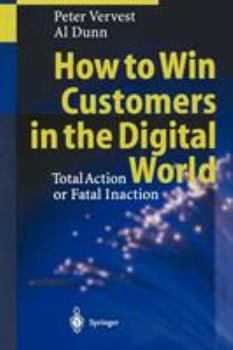How to Win Customers in the Digital World: Total Action or Fatal Inaction
Select Format
Select Condition 
Book Overview
Every organisation must strive for Total Action. Winning the customer in today's highly competitive and demanding world is the key to ensuring success. All managers and employees profess to understand this yet they find it incredibly difficult to perform together to achieve this. The 'digital world' is changing the traditional logic of business - we must now act fast and effectively to capture and retain increasingly demanding and sophisticated customers, be they individuals or organi- sations. Most customers demand much more than many organisations are able to deliver. It is said that the inventor of the telephone believed its main use would be to let someone know that a telegram was arriving. Today we know there is a lot more you can do with a telephone ... and all the surrounding digital business technologies. But you must be prepared to re-think why you are doing things the way you are. And why you are doing them at all. This is the starting point for 'How to win customers in the digital world - Total Action or Fatal Inaction'. The authors confront traditional ways of organising with the capabilities of the new, digital business technologies. They are critical of the frozen behaviour of today's large organisations. They go back to the fundamental goal that business is about making money by satisfying customers.
Format:Paperback
Language:English
ISBN:3642630650
ISBN13:9783642630651
Release Date:September 2012
Publisher:Springer
Length:250 Pages
Weight:0.86 lbs.
Dimensions:0.6" x 6.1" x 9.2"
Customer Reviews
2 ratings
A learning consultant from Buckinghamshire, U.K.
Published by Thriftbooks.com User , 24 years ago
As a facilitator of client account management programmes that include a range of learning modules, I found "How to Win Customers in the Digital World" a significantly useful book. The majority of the discussed techniques are familiar; however, the real value of the book is the way that those techniques are made accessible to the user. The majority of books of this nature never take theory through to practical use ... but this book certainly does. Real, understandable, accessible customer situations are worked through in a a manner that the reader can absorb and apply for their own organisation.
Understanding the must do's in digital business
Published by Thriftbooks.com User , 24 years ago
I don't write a lot of book reviews, not because I don't read a lot of books but because so few of them are worth reviewing. This week I'm going to make an exception since this is a very good book. The book is called "How to Win Customers in the Digital World", subtitled "Total Action or Fatal Inaction". The title and subtitle have been flipped since I saw the book in draft form a year or so ago. The authors are Al Dunn and his partner Peter Vervest. Al is based in London, and has spent most of his working life advising European telecommunications suppliers and carriers as well as other apparently slow-moving organisations on how to improve their customer service. As you can imagine, this is a difficult and thankless task. But he and Peter Vervest, plug away, spending a lot of time with companies like Finland's Nokia and Dutch and German and Swiss PTTs on change management and customer relations. (PTT is a peculiarly European acronym for "Post, Telephone and Telegraph", which indicates the term's long history. Despite being overtaken by technology and other events, it is still used to describe the major European telecommunications companies, many of which are still government owned or which behave as if they are). Al has been talking about the importance of the customer ever since I have known him, which is the best part of twenty years. Just about every organisation says that its customers are important, but a surprisingly small amount actually believe it, and even fewer adopt a customer focus as the cornerstone of their business philosophy. Common sense tells us that the customer is paramount, because they are after all the people who buy our products. But it is not just the computer industry that very often pays more attention to its products than to the people who buy them. We see it everywhere in business, and in life, and suppliers have to be constantly reminded that they are in business only because people want what they sell, are prepared to pay for it, and are happy to remain loyal if the service is good enough. This has always been true, and it always will be true. But now, with the growth of the Internet and electronic commerce, business practices are changing very quickly, and the nature of the relationship between supplier and customer is evolving accordingly. In the digital world the skills involved in attracting and retaining customers are different enough to warrant comment, hence the book. The authors make a major distinction between "total action" - which is roughly defined as "squeezing out" every activity that is not specifically important to the customer - and "fatal inaction" - intense activities that have no relationship to an organisation's performance with that customer. "These departments develop around themselves highly complex and rigid processes and systems. In due course they begin to perceive themselves as businesses in their own right, an error today's `business unit focus simp





